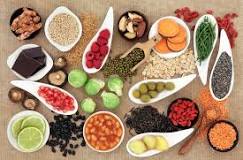Nutrition: The Foundation of Health and Vitality
Nutrition is the science of how food affects the body. It involves everything from the digestion and absorption of nutrients to how what we eat influences our energy levels, growth, immune function, and overall health. Simply put, what you eat matters—and not just for physical appearance, but for long-term well-being, mental clarity, and disease prevention.
In a world filled with processed foods, fad diets, and busy lifestyles, understanding basic nutrition is essential for making better choices and leading a healthy, balanced life.
What is Nutrition?
Nutrition is the process by which your body takes in and uses food for growth, repair, energy, and maintenance. It involves:
- Macronutrients – Nutrients needed in large amounts.
- Micronutrients – Vitamins and minerals needed in smaller amounts.
- Water – Essential for almost every function in the body.
- Fiber – Helps with digestion and gut health.
A well-balanced diet provides all of these in the right proportions to support optimal health.
Macronutrients: The Big Three
-
Carbohydrates
- Function: Primary source of energy.
- Found in: Fruits, vegetables, grains, legumes, dairy.
- Types: Simple (sugars) and complex (whole grains, fiber-rich foods).
- Note: Complex carbs are healthier because they digest slowly and keep blood sugar stable.
-
Proteins
- Function: Build and repair muscles, tissues, enzymes, and hormones.
- Found in: Meat, poultry, fish, eggs, legumes, nuts, dairy, soy.
- Amino Acids: Building blocks of protein. Some are essential and must be obtained from food.
-
Fats
- Function: Energy storage, brain health, hormone production, vitamin absorption.
- Types:
- Healthy fats: Unsaturated fats (avocados, nuts, olive oil).
- Unhealthy fats: Trans fats and excess saturated fats (processed snacks, fried foods).
- Note: Fat isn’t bad—quality and quantity matter.
Micronutrients: Vitamins and Minerals
Though needed in small amounts, vitamins and minerals are vital for:
- Immune function
- Bone health
- Blood clotting
- Energy production
- Nerve and muscle function
Common Examples:
- Vitamin C: Boosts immune system, found in citrus fruits.
- Vitamin D: Bone health, from sunlight and fortified foods.
- Iron: Needed for oxygen transport in blood, found in red meat, leafy greens.
- Calcium: Strengthens bones, found in dairy, tofu, and leafy greens.
The Role of Water
Water is the most important nutrient. Your body is over 60% water, and it plays a role in:
- Digestion
- Temperature regulation
- Transporting nutrients
- Removing waste
- Joint lubrication
Tip: Aim for 6–8 glasses a day, more if you’re active or in a hot climate.
Balanced Nutrition: What Does It Look Like?
A healthy, balanced diet includes:
- A variety of whole foods
- Plenty of vegetables and fruits
- Lean proteins
- Healthy fats
- Whole grains
- Limited processed foods, added sugars, and sodium
The easiest way to visualize this is the “Plate Method”:
- Half your plate: vegetables and fruits
- One quarter: lean proteins
- One quarter: whole grains
- Plus: a serving of healthy fat and water
Common Diet Types and What They Emphasize
| Diet Type | Focus |
|---|---|
| Mediterranean | Olive oil, fish, vegetables, whole grains |
| Plant-Based | Vegetables, fruits, legumes, nuts |
| Paleo | Whole foods, no grains or processed items |
| Ketogenic | High fat, very low carb |
| Intermittent Fasting | When you eat, not just what you eat |
Note: No one diet fits all. The best eating plan is one that is sustainable, nutrient-rich, and aligned with your goals and health needs.
Why Good Nutrition Matters
- Boosts Energy
Proper fuel helps you feel alert, focused, and productive. - Supports Immune Function
A well-nourished body fights off illness and heals faster. - Promotes Healthy Weight
Balanced nutrition helps you maintain or reach a healthy body weight naturally. - Improves Mental Health
Nutrients like omega-3s, B vitamins, and antioxidants support brain function and mood. - Prevents Chronic Diseases
Good nutrition reduces risk of heart disease, diabetes, cancer, and more. - Enhances Longevity
People with healthier diets tend to live longer, with better quality of life.
Tips for Healthy Eating
- Eat whole, minimally processed foods most of the time.
- Read nutrition labels to spot hidden sugars and unhealthy fats.
- Cook at home more often—it’s healthier and more affordable.
- Listen to your body’s hunger cues—eat when you’re hungry, stop when you’re satisfied.
- Plan meals and snacks to avoid impulsive eating.
- Stay hydrated throughout the day.
- Enjoy treats in moderation—healthy eating isn’t about perfection.
Nutrition and Lifestyle
Nutrition doesn’t exist in a vacuum—it works together with exercise, sleep, and stress management. All are important for maintaining a strong, resilient, and healthy body.
- Poor sleep can affect food choices and metabolism.
- Chronic stress may lead to overeating or cravings.
- Regular exercise increases your body’s need for quality nutrition.
By pairing balanced eating with other healthy habits, you support your entire well-being.
Conclusion
Nutrition is not just about diets or counting calories—it’s about nourishing your body with the right foods so you can thrive. From energizing your workouts to protecting you against disease, the food you eat plays a central role in your life.
The key is balance: eating a wide variety of nutrient-rich foods in appropriate portions, enjoying meals mindfully, and building habits that support your health for the long run. When you eat well, you don’t just look better—you feel better, think clearer, and live more fully.

